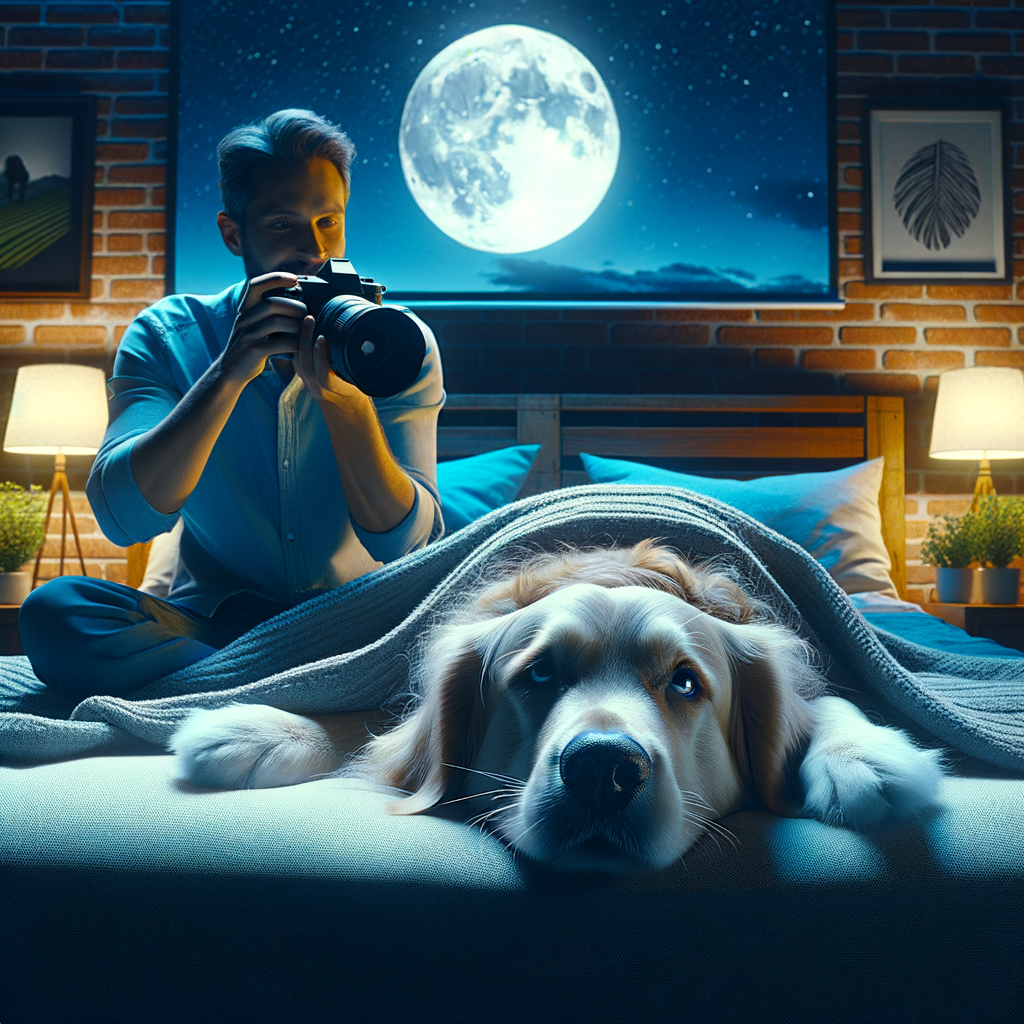How to Stop Dog Itching at Night: Tips for a Peaceful Sleep

How to Stop Dog Itching at Night: Tips for a Peaceful Sleep
-
Table of Contents
Introduction
Introduction:
If your dog is constantly itching and scratching at night, it can not only be frustrating for you but also uncomfortable for your furry friend. In order to ensure a peaceful night’s sleep for both you and your dog, it’s important to address the underlying cause of the itching. Here are some tips on how to stop dog itching at night and promote a restful sleep for your canine companion.
Implementing a Night-time Itch Relief Routine
Do you have a furry friend who just can’t seem to stop itching at night? It can be frustrating for both you and your dog when they are constantly scratching and keeping you up at night. But fear not, there are some simple tips and tricks you can implement to help alleviate your dog’s night-time itching and ensure a peaceful sleep for both of you.
One of the first things you can do to help stop your dog from itching at night is to establish a night-time itch relief routine. This routine can include a variety of steps and products that can help soothe your dog’s skin and reduce their urge to scratch.
First and foremost, it’s important to make sure your dog is on a regular grooming schedule. Regular baths with a gentle, hypoallergenic shampoo can help remove any irritants or allergens from your dog’s skin and coat, reducing the likelihood of itching. Be sure to thoroughly rinse your dog after their bath to remove any leftover shampoo residue that could further irritate their skin.
In addition to regular baths, you may also want to consider using a soothing oatmeal or medicated shampoo specifically designed to help relieve itching and irritation. These shampoos can help calm your dog’s skin and provide relief from the constant urge to scratch.
After bathing your dog, be sure to thoroughly dry them off with a clean towel. Moisture left on your dog’s skin can exacerbate itching, so it’s important to make sure they are completely dry before bedtime.
Once your dog is clean and dry, you may want to consider applying a soothing topical treatment to any areas of their skin that are particularly itchy. There are a variety of over-the-counter creams and sprays available that can help provide relief from itching and irritation. Just be sure to follow the instructions on the product label and consult with your veterinarian if you have any concerns.
In addition to topical treatments, you may also want to consider using a calming spray or diffuser in your dog’s sleeping area. These products contain natural ingredients like lavender and chamomile that can help promote relaxation and reduce stress, which can in turn help reduce itching.
Finally, it’s important to make sure your dog is comfortable while they sleep. Provide them with a cozy bed and ensure their sleeping area is free from any potential irritants like dust or allergens. You may also want to consider using a hypoallergenic laundry detergent to wash your dog’s bedding regularly.
By implementing a night-time itch relief routine that includes regular grooming, soothing shampoos, topical treatments, calming sprays, and a comfortable sleeping environment, you can help stop your dog from itching at night and ensure a peaceful sleep for both of you. So say goodbye to sleepless nights filled with scratching and hello to restful nights of sweet dreams for you and your furry friend.
Creating a Comfortable Sleeping Environment for Your Dog

If you’re a dog owner, you know how important it is for your furry friend to get a good night’s sleep. But what do you do when your dog is constantly itching and scratching at night, keeping both of you awake? It can be frustrating and exhausting for both you and your pet. But fear not, there are some simple tips and tricks you can try to help alleviate your dog’s itching and ensure a peaceful night’s sleep for everyone.
First and foremost, it’s important to create a comfortable sleeping environment for your dog. Just like humans, dogs need a cozy and inviting space to rest and relax. Make sure your dog’s bed is clean and free of any irritants that could be causing their itching. Wash their bedding regularly with a gentle, hypoallergenic detergent to remove any allergens or irritants that could be triggering their itching.
Next, consider the temperature of your dog’s sleeping area. Just like humans, dogs can be sensitive to extreme temperatures. Make sure their sleeping area is not too hot or too cold, as this could exacerbate their itching. If your dog sleeps outside, consider providing them with a warm, insulated dog house or a cozy blanket to snuggle up with. If your dog sleeps inside, make sure the room is well-ventilated and at a comfortable temperature.
Another important factor to consider is your dog’s diet. Just like humans, dogs can have food allergies or sensitivities that could be causing their itching. Make sure your dog is eating a high-quality, balanced diet that is free of any potential allergens. Consider switching to a grain-free or hypoallergenic dog food to see if this helps alleviate their itching. Additionally, make sure your dog is getting enough essential fatty acids in their diet, as these can help improve their skin and coat health.
In addition to creating a comfortable sleeping environment and ensuring your dog’s diet is on point, there are some other tips you can try to help stop your dog from itching at night. One simple solution is to give your dog a soothing oatmeal bath before bedtime. Oatmeal has natural anti-inflammatory properties that can help calm irritated skin and reduce itching. Just make sure to use a gentle, dog-friendly oatmeal shampoo and rinse thoroughly to remove any residue.
You can also try using a natural, soothing topical treatment on your dog’s skin to help alleviate their itching. Look for products that contain ingredients like aloe vera, chamomile, or calendula, which have anti-inflammatory and calming properties. Just be sure to consult with your veterinarian before trying any new products on your dog’s skin, as some ingredients could be irritating or harmful.
Finally, if your dog’s itching persists despite your best efforts, it’s important to consult with your veterinarian. They can help determine the underlying cause of your dog’s itching and recommend appropriate treatment options. In some cases, your dog may need prescription medication or a specialized treatment plan to help alleviate their itching and improve their quality of sleep.
In conclusion, dealing with a dog that is constantly itching at night can be challenging, but with some simple tips and tricks, you can help create a comfortable sleeping environment for your furry friend and ensure a peaceful night’s sleep for everyone. By addressing potential triggers like allergens, temperature, diet, and using soothing treatments, you can help stop your dog from itching at night and improve their overall well-being. Remember, if your dog’s itching persists, don’t hesitate to consult with your veterinarian for further guidance and support. A good night’s sleep is essential for both you and your beloved pet, so take the necessary steps to ensure a restful and itch-free night for all.
Identifying the Root Cause of Your Dog’s Itching
Does your dog keep you up at night with their incessant scratching and itching? It can be frustrating for both you and your furry friend when they can’t seem to find relief. But fear not, there are steps you can take to help alleviate your dog’s itching and ensure a peaceful night’s sleep for everyone.
The first step in addressing your dog’s itching at night is to identify the root cause. There are several reasons why your dog may be itching more at night, including allergies, dry skin, parasites, or even stress. By pinpointing the underlying issue, you can better tailor your approach to providing relief for your pup.
One common cause of itching in dogs is allergies. Just like humans, dogs can be allergic to a variety of things, including certain foods, environmental allergens like pollen or dust, or even flea bites. If you suspect that your dog’s itching is due to allergies, it’s important to work with your veterinarian to determine the specific allergen and develop a treatment plan.
Dry skin is another common culprit of itching in dogs, especially during the winter months when the air is dry. To help alleviate your dog’s itching, consider adding a humidifier to your home to increase moisture in the air. You can also try using a moisturizing shampoo or conditioner specifically designed for dogs to help hydrate their skin and coat.
Parasites like fleas and mites can also cause itching in dogs, particularly at night when these pesky critters are most active. Regularly checking your dog for signs of fleas or mites, such as red bumps or tiny black specks in their fur, can help you catch and treat infestations early. Your veterinarian can recommend the best flea and tick prevention products for your dog to help keep these parasites at bay.
Stress and anxiety can also manifest as itching in dogs, especially if they are left alone for long periods or experience changes in their routine. Providing your dog with plenty of exercise, mental stimulation, and attention can help reduce their stress levels and alleviate itching. You may also consider using calming supplements or pheromone diffusers to help your dog relax and feel more at ease.
Once you have identified the root cause of your dog’s itching at night, you can begin implementing strategies to help them find relief. This may include adjusting their diet, using medicated shampoos or creams, or providing them with supplements to support their skin and coat health. It’s important to be patient and consistent in your approach, as it may take time to see improvements in your dog’s itching.
In conclusion, dealing with a dog that itches at night can be challenging, but with the right approach, you can help your furry friend find relief and enjoy a peaceful night’s sleep. By identifying the root cause of your dog’s itching and implementing targeted strategies to address it, you can help your dog feel more comfortable and content. Remember to work closely with your veterinarian to develop a treatment plan that is tailored to your dog’s specific needs. With a little time and effort, you and your dog can both get a good night’s rest.
Conclusion
Conclusion: By following these tips such as keeping your dog clean, using a hypoallergenic dog bed, providing a balanced diet, and consulting with a veterinarian, you can help alleviate your dog’s itching at night and ensure a peaceful sleep for both you and your furry friend.

